- Home
- Quizzes
- My Quiz Activity
- Newsletters
- MY FAVORITES
- Add Sports/Teams
- SPORTS
-
NFL
- NFL Home
- Arizona Cardinals
- Atlanta Falcons
- Baltimore Ravens
- Buffalo Bills
- Carolina Panthers
- Chicago Bears
- Cincinnati Bengals
- Cleveland Browns
- Dallas Cowboys
- Denver Broncos
- Detroit Lions
- Green Bay Packers
- Houston Texans
- Indianapolis Colts
- Jacksonville Jaguars
- Kansas City Chiefs
- Las Vegas Raiders
- Los Angeles Chargers
- Los Angeles Rams
- Miami Dolphins
- Minnesota Vikings
- New England Patriots
- New Orleans Saints
- New York Jets
- New York Giants
- Philadelphia Eagles
- Pittsburgh Steelers
- San Francisco 49ers
- Seattle Seahawks
- Tampa Bay Buccaneers
- Tennessee Titans
- Washington Commanders
-
MLB
- MLB Home
- Athletics
- Arizona Diamondbacks
- Atlanta Braves
- Baltimore Orioles
- Boston Red Sox
- Chicago White Sox
- Chicago Cubs
- Cincinnati Reds
- Cleveland Guardians
- Colorado Rockies
- Detroit Tigers
- Houston Astros
- Kansas City Royals
- Los Angeles Angels
- Los Angeles Dodgers
- Miami Marlins
- Milwaukee Brewers
- Minnesota Twins
- New York Yankees
- New York Mets
- Philadelphia Phillies
- Pittsburgh Pirates
- San Diego Padres
- San Francisco Giants
- Seattle Mariners
- St. Louis Cardinals
- Tampa Bay Rays
- Texas Rangers
- Toronto Blue Jays
- Washington Nationals
-
NBA
- NBA Home
- Atlanta Hawks
- Boston Celtics
- Brooklyn Nets
- Charlotte Hornets
- Chicago Bulls
- Cleveland Cavaliers
- Dallas Mavericks
- Denver Nuggets
- Detroit Pistons
- Golden State Warriors
- Houston Rockets
- Indiana Pacers
- Los Angeles Clippers
- Los Angeles Lakers
- Memphis Grizzlies
- Miami Heat
- Milwaukee Bucks
- Minnesota Timberwolves
- New Orleans Pelicans
- New York Knicks
- Oklahoma City Thunder
- Orlando Magic
- Philadelphia 76ers
- Phoenix Suns
- Portland Trail Blazers
- Sacramento Kings
- San Antonio Spurs
- Toronto Raptors
- Utah Jazz
- Washington Wizards
-
NHL
- NHL Home
- Anaheim Ducks
- Boston Bruins
- Buffalo Sabres
- Calgary Flames
- Carolina Hurricanes
- Chicago Blackhawks
- Colorado Avalanche
- Columbus Blue Jackets
- Dallas Stars
- Detroit Red Wings
- Edmonton Oilers
- Florida Panthers
- Los Angeles Kings
- Minnesota Wild
- Montreal Canadiens
- Nashville Predators
- New Jersey Devils
- New York Islanders
- New York Rangers
- Ottawa Senators
- Philadelphia Flyers
- Pittsburgh Penguins
- San Jose Sharks
- Seattle Kraken
- St. Louis Blues
- Tampa Bay Lightning
- Toronto Maple Leafs
- Utah Mammoth
- Vancouver Canucks
- Vegas Golden Knights
- Washington Capitals
- Winnipeg Jets
- NCAAF
- NCAAM
- Olympics
- Boxing
- Entertainment
- Lifestyle
- Golf
- MMA
- Soccer
- Tennis
- Wrestling
- Sports Betting
- More Sports
- RESOURCES
- My Account
- YB on Facebook
- YB on Twitter
- YB on Flipboard
- Contact Us
- Privacy Policy
- Terms of Service
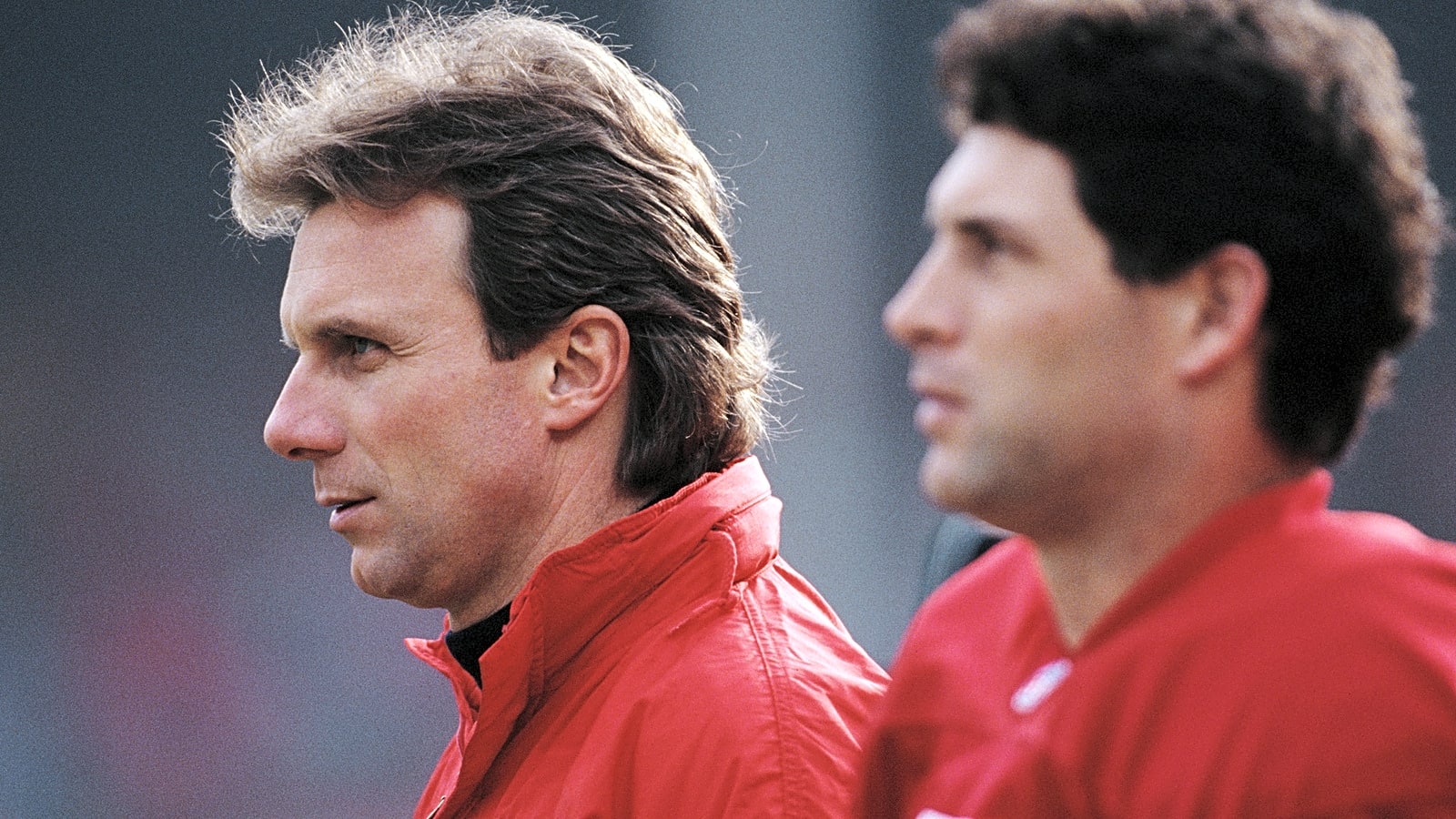
NFL quarterbacks who were replaced by future Hall of Famers
We covered how difficult it can be to replace a franchise quarterback. Conversely, here are the players displaced by the arrivals of Hall of Fame passers throughout NFL history.
Peyton Manning ( Denver Broncos): Tim Tebow

The Broncos traded three picks to climb back into the 2010 first round to draft Tebow, a dominant college performer viewed as a raw prospect. Tebow's popularity largely overshadowed the Broncos during his two-year tenure. He overtook Kyle Orton for Denver's starting job after a 1-4 2011 start. Rather than any #SuckforLuck-ing, the Broncos strung together a rather unusual six-game win streak and reached the playoffs at 8-8. Tebow posted his best day as a pro to lead the Broncos past the Steelers -- via Demaryius Thomas' OT walk-off -- but GM John Elway viewed the inaccurate passer as unqualified. Manning's 2012 free agency addition preceded a Tebow trade to the Jets the following day.
Brett Favre ( Minnesota Vikings): Tarvaris Jackson
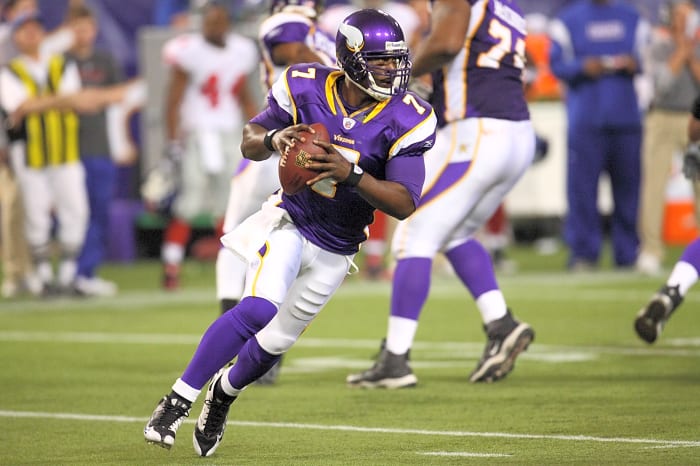
The Vikings went 8-4 with Jackson -- a 2006 second-round pick -- at the helm in 2007. The team benched him for journeyman Gus Frerotte early in 2008, but Jackson reacquired the job after a December Frerotte back injury. Jackson helped the Vikes to the NFC North title, as the team beat a Giants squad that had clinched the NFC's No. 1 seed in Week 17. The Eagles won an uneventful wild-card game in Minnesota a week later. Including poison-pill language in their Jets Favre trade aimed to nix a future trade to the Vikings, the Packers still saw Favre in purple once he unretired and signed with Minnesota in August 2009.
Brett Favre (New York Jets): Chad Pennington
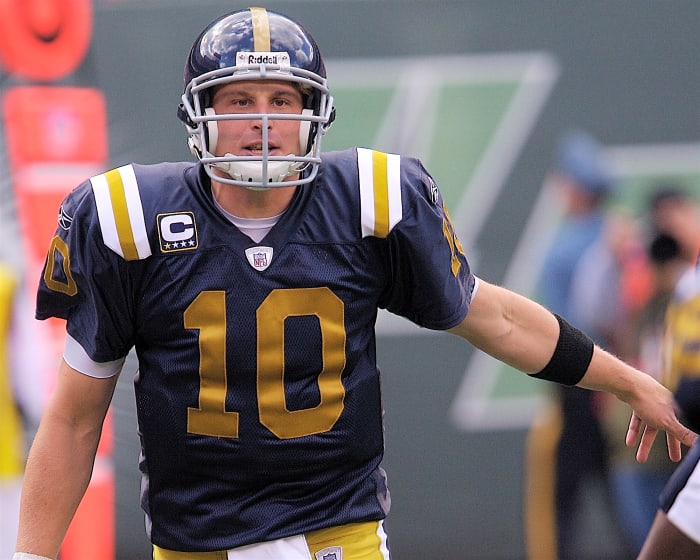
Beating out the Buccaneers for Favre's rights in August 2008, the Jets acquired the 38-year-old Packers icon and discarded Pennington via release the next day. Part of a four-first-rounder Jets draft in 2000, Pennington remains the team's longest-serving QB since Ken O'Brien. Taking over for Vinny Testaverde during the 2002 season, Pennington piloted Herm Edwards' team to a resurgence and a divisional-round berth. The Jets made two more playoff journeys with Pennington, who earned the first of his two Comeback Player of the Year nods in leading Gang Green to the 2006 AFC bracket. Another injury slowed him in 2007, preceding the second of those CPOY awards, which came in Miami.
Kurt Warner ( Arizona Cardinals): Josh McCown
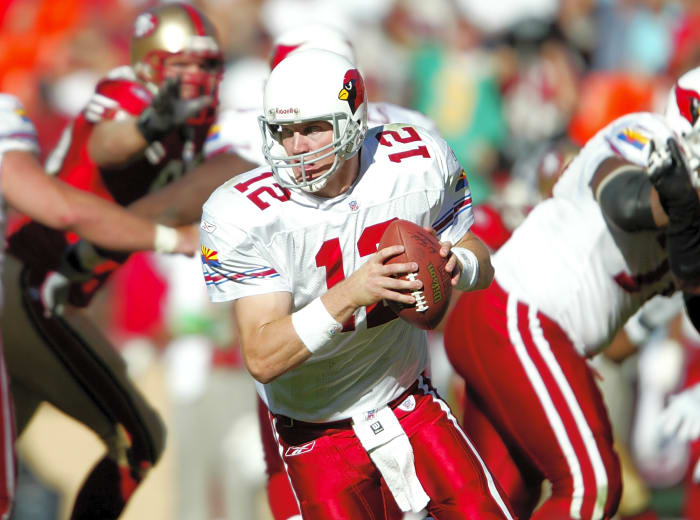
McCown's deep jersey arsenal includes nine NFL teams and one squad in the OG United Football League (2010's Hartford Colonels). His most extended stay, however, came in Arizona. The Cardinals drafted the SMU alum in the 2002 third round, and 2004 became his extended QB1 year. This came for an interesting team, as the Cardinals rostered 2003 Offensive Rookie of the Year Anquan Boldin, future receiving kingpin Larry Fitzgerald (as a rookie) and all-time rushing leader Emmitt Smith in his finale. Dennis Green's team went 6-10 but 6-7 in McCown's starts. The future journeyman posted an 11-10 TD:INT ratio. McCown backed up Warner in 2005, starting his nomadic odyssey in '06.
Kurt Warner (New York Giants): Kerry Collins
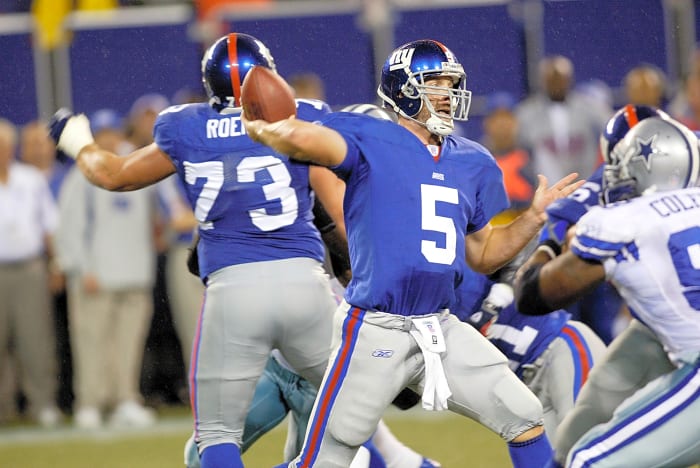
Collins did not exactly hide his unhappiness with the Giants' Eli Manning-based plan in the 2004 draft. After their Manning-Philip Rivers switcheroo, the Giants cut Collins, a five-year New York starter, rather than pay him $7 million in 2004. Rebounding from a Panthers washout, the former top-five pick led the Giants to two postseasons -- including a Super Bowl XXXV run -- during his time at the helm. Collins ensured the 2000 team would make good on Jim Fassel's famous playoff guarantee, delivering a historic outing (381 yards, five TD passes) in a 41-0 NFC title game win over the Vikings. After a Giants wild-card collapse in 2002, Collins went 4-9 as an '03 starter. Dropped by the Rams in June, Warner became the Manning bridge.
Kurt Warner (St. Louis Rams): Tony Banks
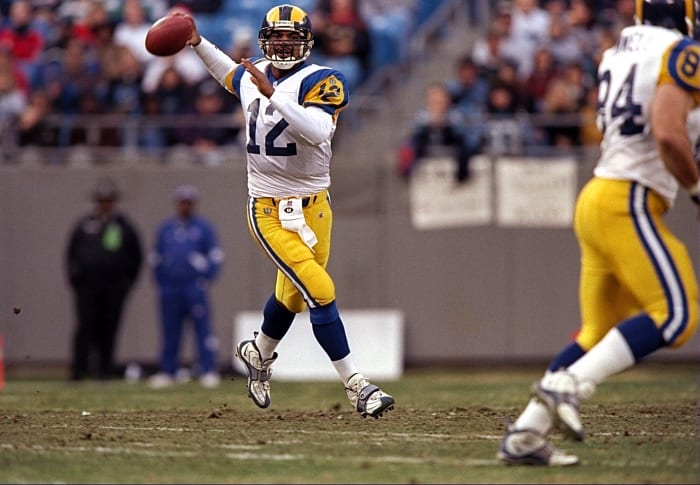
Yes, Trent Green was set to be the Rams' triggerman in 1999. But the future Chiefs Pro Bowler's injury occurred in the preseason. The Rams had signed Green to a four-year, $17.5 million deal to replace Banks, who delivered uneven work in a three-year starter run. Banks failed to complete 53% of his passes as St. Louis' starter in 1996 and '97, and while he upped that number to 59.1 in '98, he posted a 7:14 TD:INT ratio. The Rams, who had stashed Warner as a backup since a December 1997 signing, traded Banks to the Ravens for fifth- and seventh-round picks. As Banks lasted 1 1/2 years as Baltimore's starter, Marshall Faulk and Torry Holt were en route to help Warner.
Peyton Manning (Indianapolis Colts): Jim Harbaugh
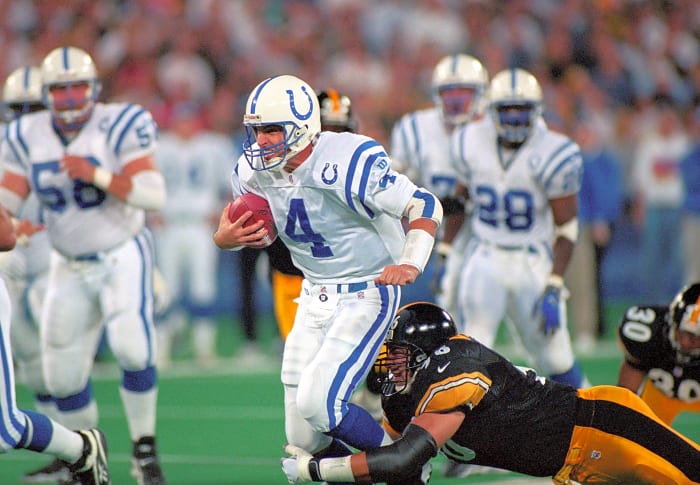
Benefiting from Manning not leaving Tennessee for the Jets after his junior season, the Colts completed the first of their fortuitous tumbles in 1997. Harbaugh was at the wheel, going 2-9 as a starter during an injury-plagued season. Harbaugh's fourth and final Colts year is best remembered for him breaking his hand during a fight with then-NBC analyst Jim Kelly, who reportedly had questioned the Indianapolis QB's toughness. This cost Harbaugh four games. The Colts lost three but somehow upset the NFC champion Packers. Harbaugh, who had led Indy to the 1995 AFC championship game, became a Charger (in a trade that sent the Colts third- and fourth-round picks) in February 1998.
Warren Moon (Seattle Seahawks): Rick Mirer
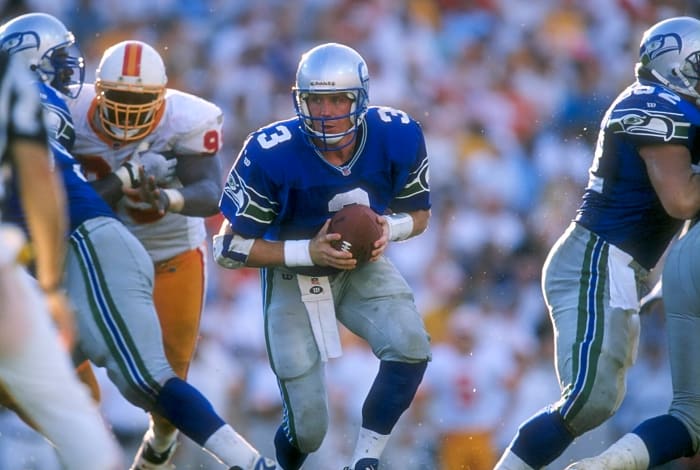
The Seahawks lost a high-stakes free agency battle for Moon, a Washington native, in 1984. The Oilers' $1 million-per-year offer won out. Despite Moon's career being delayed as CFL dominance commenced, he was still an effective starting QB by 1997. The Seahawks circled back to Moon in 1997, doing so after clearing the decks by unloading Mirer -- the No. 2 pick in the 1993 draft and a four-year Seattle starter -- to the Bears. Chicago gave up a first-round pick for Mirer and a fourth in a lopsided deal. Mirer started 51 games in Seattle but was unable to turn the then-AFC West-stationed team into a contender; he started only six games in Chicago.
Warren Moon (Minnesota Vikings): Jim McMahon
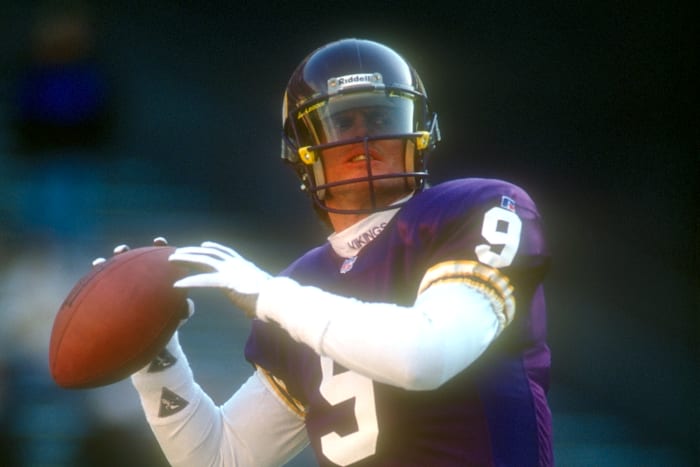
Three years earlier, Moon moved McMahon out of the picture in Minnesota. The former Bears Super Bowl-winning QB was notoriously injury-prone; his last gasp as a starter came for the 1993 Vikings. McMahon held up for 12 games and guided Minnesota to the playoffs. The Vikes had signed McMahon -- previously a Randall Cunningham Eagles backup -- in the first year of free agency, giving the brittle veteran a two-year deal. As a chaotic Oilers team suffered yet another playoff letdown and prepared to rebuild, the Vikings pounced by obtaining Moon for third- and fourth-round picks. As two more Moon Pro Bowls followed, McMahon reunited with Buddy Ryan as a Cardinals backup.
Joe Montana ( Kansas City Chiefs): Dave Krieg

Plateauing with Krieg and Steve DeBerg by 1993, the Chiefs and Montana struck a marriage of convenience. The 49er legend nixed a trade to the lowly Cardinals and agreed to be dealt to the Chiefs. This booted Krieg from his QB1 perch, but he remained a key presence as Montana's injury issues followed him to Missouri. The longtime Seahawk signed with the Chiefs as a Plan B free agent -- in the final year of that system (1992) -- and piloted them to a 10-6 season. The Chargers blanked the Chiefs in the wild-card round, and K.C. eyed Montana as a ceiling raiser. Krieg was still needed, though, starting five games and making two playoff cameos for the 1993 team.
Brett Favre (Green Bay Packers): Don Majkowski
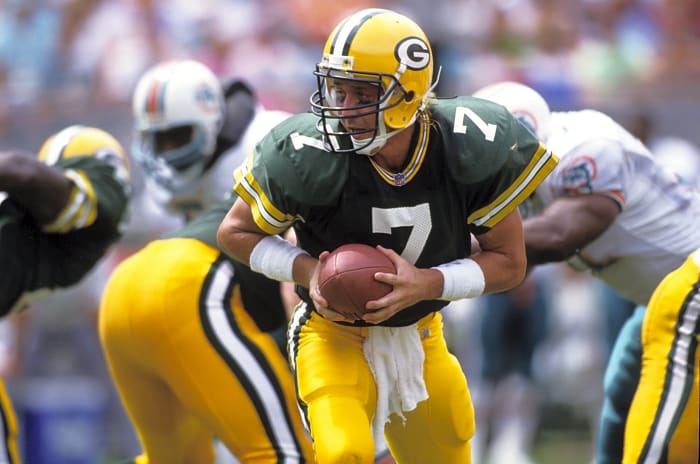
Famous for a volume-based approach to QB investing, Ron Wolf traded a first-rounder for Favre in his second year as Packers GM. Majkowski held onto his starting job into the 1992 season but lost it upon suffering an ankle injury in Week 3, beginning Favre's ironman streak. Injuries defined Majkowski's lengthy stint as Green Bay's starter. The 1987 10th-round pick made 49 starts from 1987-92, completing a stunning rise to an MVP runner-up finish by '89. A 1990 holdout preceded a rotator cuff tear, and a hamstring injury sidelined him for a chunk of the '91 season. After Majkowski missed 16 games from 1990-91, Wolf added Favre from the Falcons.
Steve Young (San Francisco 49ers): Joe Montana
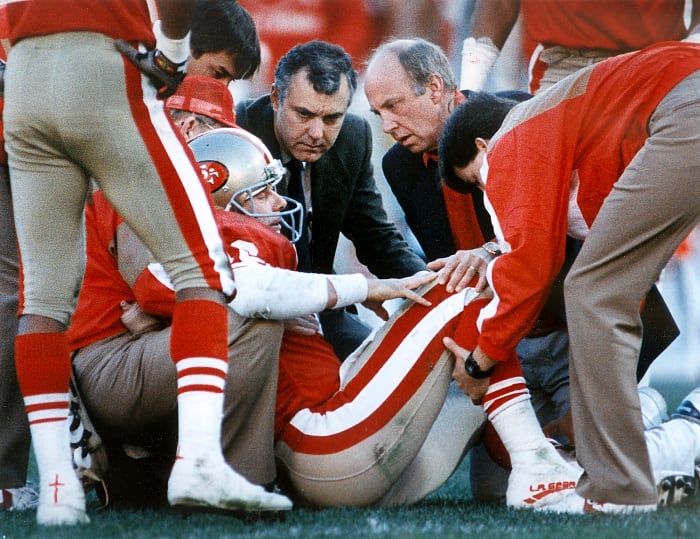
Young forced the issue in 1988, but Montana held off his challenger by year's end, settling into one of the signature grooves in QB history . Bill Walsh's retirement did not slow Joe Cool, who reeled off back-to-back MVP campaigns during his age-33 and age-34 seasons. The 49ers went 28-4 from 1989-90, not losing on the road in this span, and Montana had established himself as his era's premier QB. The West Coast Offense pilot, however, remained injury-prone. After Leonard Marshall's punishing hit KO'd Montana in the 1990 NFC championship game, an elbow setback before the '91 season ushered in the Young era. Montana's final 49ers start came in a meaningless 1992 regular-season finale.
Troy Aikman ( Dallas Cowboys): Steve Pelluer
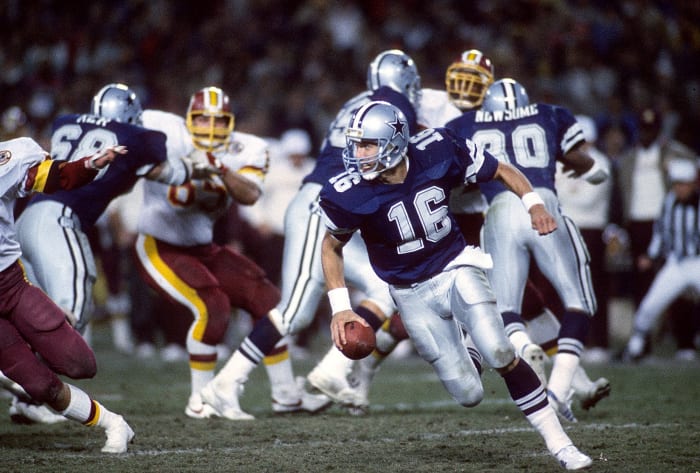
Danny White had recaptured his starting job from Gary Hogeboom after losing it in 1984, and the Roger Staubach successor started 29 games from 1985-87. Injuries took a toll, however, and Pelluer -- a 1984 fifth-round Cowboys pick -- played a relief role during the 1986 and '87 slates. The Washington alum won the job to open 1988, relegating White to backup duty, and started 14 games. The Cowboys went 3-11 in those contests, free-falling to the No. 1 overall draft slot in 1989. Pelluer, who had thrown 17 TD passes compared to 19 INTs in Tom Landry's finale, ended up a Chief early in Jimmy Johnson's tenure, being traded for third- and fourth-round picks.
Jim Kelly (Buffalo Bills): Bruce Mathison

Already losing starting running back Joe Cribbs to the USFL, the Bills also saw Kelly opt for bigger money in the upstart league. Kelly was quite content lighting up scoreboards for the Houston Gamblers, leaving the Bills in disarray. Ex-Rams Super Bowl starter Vince Ferragamo -- acquired in a July 1985 trade -- opened the '85 season as Buffalo's starter. The woeful team benched the veteran for ex-Dan Fouts backup Mathison, a free agent pickup. Mathison went 1-6 in seven games as a starter, posting a 4-14 TD:INT ratio. Those would be Mathison's only NFL starts, as the USFL's folding brought Kelly in as an 1986 NFL rookie.
Steve Young (Tampa Bay Buccaneers): Steve DeBerg
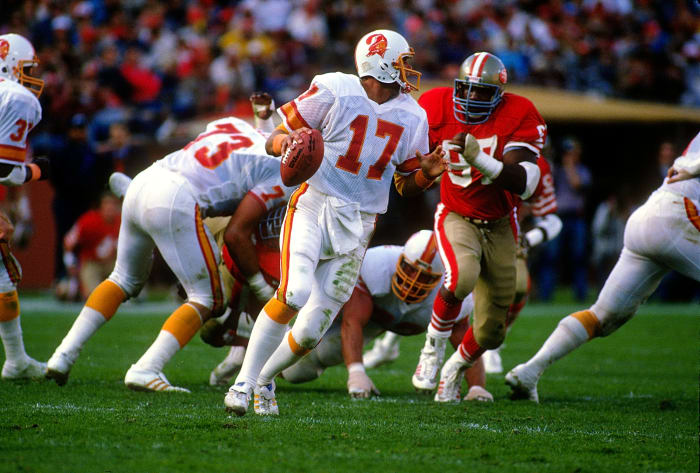
The Buccaneers had hoped their trade for former top-five pick Jack Thompson would solve their post-Doug Williams QB issue, but that did not happen. After the Bucs struggled during Thompson's time in the QB1 spot in 1983, they obtained DeBerg from the Broncos for second- and fourth-round picks. The Broncos ended up fetching the latter draft choice because DeBerg met playing-time conditions, starting 13 games for the 1984 Bucs. Young came over from the USFL in 1985, but Tampa Bay did not turn to the former No. 1 pick until Week 12. Young started the final five games that year, becoming the third Hall of Famer to replace DeBerg in the 1980s (see below).
Warren Moon (Houston Oilers): Oliver Luck
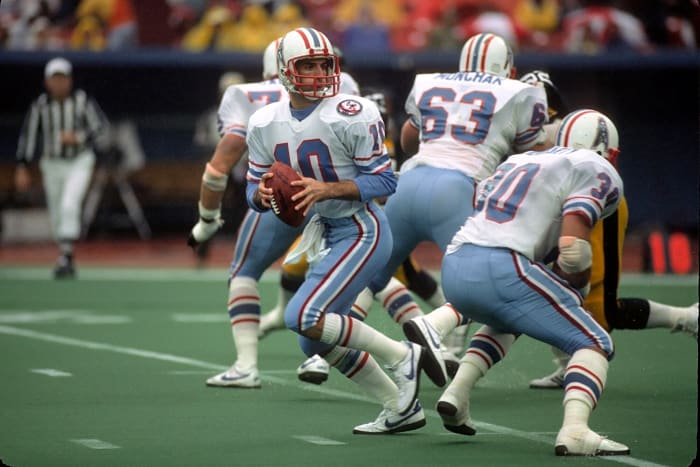
The Oilers went from September 1982 to November 1983 without a win. Although the 1982 strike makes that slightly less horrendous, they had fallen far since the Bum Phillips days. Luck replaced longtime backup Gifford Nielsen during a 55-14 blowout loss to the Bengals and led to the Oilers snapping their streak, throwing two TD passes in a win over the Lions, two weeks later. The Oilers gave Luck six starts to close out the '83 season, but they soon won the Moon sweepstakes by authorizing the NFL's first $1 million-per-year contract . The five-time Grey Cup champ took over and held the job for 10 years; Andrew Luck's father ended his career after three seasons as Moon's backup.
Dan Marino ( Miami Dolphins): David Woodley

Bob Griese retired after the 1980 season, but the Dolphins did not fall off. Their highest peak between back-to-back Super Bowl wins in the early 1970s and Dan Marino's stratospheric 1984 season came with Woodley at the helm. An eighth-round pick in 1980, Woodley went 18-5-1 as a starter from 1981-82. In that time, Miami lost an epic duel with San Diego in the 1981 divisional round (featuring Don Strock filling in for Woodley) and was competitive against Washington in a Super Bowl XVII loss a year later. Marino falling to No. 27 in the 1983 draft changed Woodley's path, and Marino took over in Week 6 of the '83 season. The Dolphins traded Woodley to the Steelers in 1984.
John Elway (Denver Broncos): Steve DeBerg
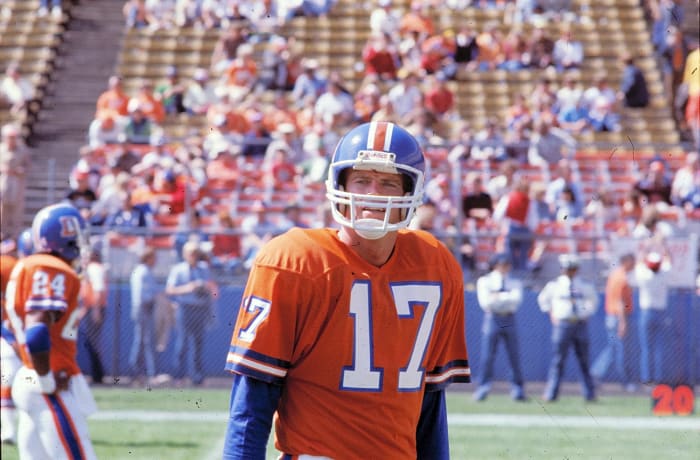
DeBerg's second placement as a bridge to an all-time great occurred in Denver. With DeBerg's San Francisco mission complete by 1981, the 49ers traded him to the Broncos for a fourth-round pick. He backed up Craig Morton that year but usurped him during the 1982 season. Morton started the first two games that year, but in the first game after a strike wiped out two months of the NFL calendar, DeBerg stepped in. DeBerg closed out his fifth NFL season with five starts, but John Elway's 1983 arrival led him back to the bench. The Broncos still relied on DeBerg, amid Elway growing pains, for five starts (four wins) in '83. DeBerg even started the team's playoff game before being traded to the Buccaneers.
Ken Stabler (New Orleans Saints): Archie Manning

Few players would have benefited from free agency more than Manning, who was tied to mostly terrible Saints teams. The Saints drafted Manning second overall in 1971 and used him as their starter for 10 seasons (with a missed 1976 slate excluded). The Manning patriarch made two Pro Bowls, but 1981 head coaching hire Bum Phillips had seen enough after one season. Two years after trading for Stabler as Oilers HC, Phillips signed him for the Saints in free agency. The Saints traded their cornerstone QB to the Oilers for All-Pro left tackle Leon Gray, who made zero starts in two New Orleans seasons, in September 1982. Manning made eight over two years in Houston, finishing his career in Minnesota.
Joe Montana (San Francisco 49ers): Steve DeBerg
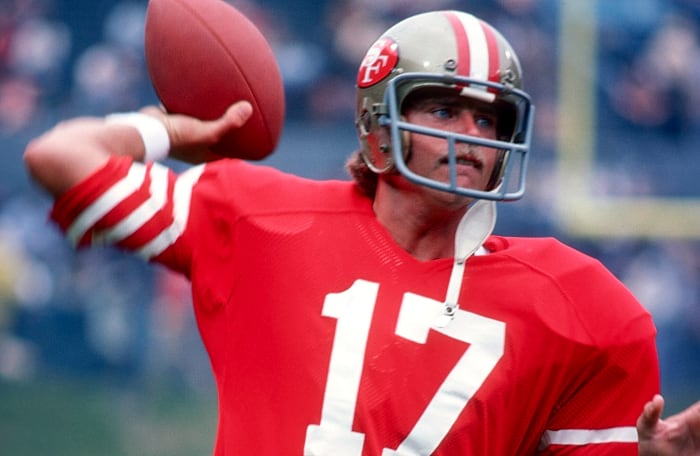
Of DeBerg's three mentorship programs, Montana's took the longest. The 49ers drafted Montana in the 1979 third round but parked him behind DeBerg -- a 1977 10th-round Cowboys draftee whom the 49ers signed in September of that year -- for most of the season. The San Jose State alum started 15 games for the rebuilding 49ers in 1979, leading the NFL with 379 completions during a 2-14 season. Bill Walsh continued grooming Montana during the first half of the 1980 season, but the Bay Area legend took over for good by Week 13. DeBerg played 17 NFL seasons, coming back after a four-year retirement to back up Chris Chandler for the 1998 NFC champion Falcons.
Ken Stabler (Houston Oilers): Dan Pastorini
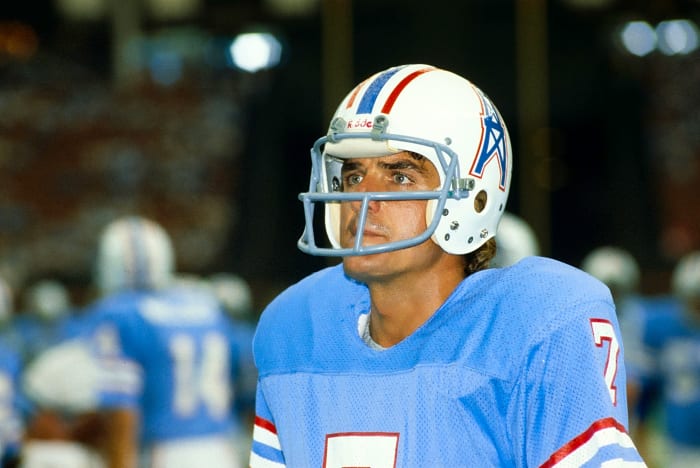
Stabler's second stop came after an unusual trade. Following the Steelers' four Super Bowl title in 1979, their two main rivals swapped starters. The Raiders and Oilers traded Stabler and Dan Pastorini straight up . Prior to the swap, Pastorini had helped the Oilers complete a rebuild — well, he may have ridden shotgun to RB sensation Earl Campbell — and had made a Pro Bowl during his nine-year stay in Houston. Injuries lingered for the sack-prone Pastorini, but he never missed more than four games in a season with Houston. A broken leg, however, sidelined Pastorini five games into his Raiders tenure. Jim Plunkett took over and led the Raiders to a Super Bowl title.
Joe Namath ( Los Angeles Rams): Pat Haden
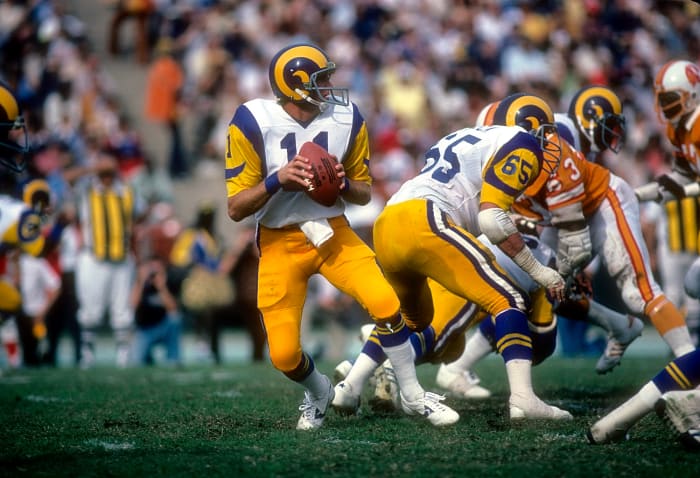
Namath and Unitas ended their careers as California afterthoughts. The Rams shuffling QBs during a trade-happy stretch in the 1970s prompted them to sign Namath , whose Jets prime ended early due to ongoing knee trouble. A 1975 seventh-round pick, Haden had taken over as Los Angeles' starter midway through the 1976 season. On a roster housing Ron Jaworski and James Harris, Haden started both Rams playoff games that year. The moderately talented QB did not play particularly well, leading the Rams to try Namath in 1977. Haden's demotion was temporary; he replaced Namath in Week 4 -- a chest injury felled Broadway Joe -- and kept the job the rest of the way during a Pro Bowl season.
Dan Fouts (San Diego Chargers): Johnny Unitas
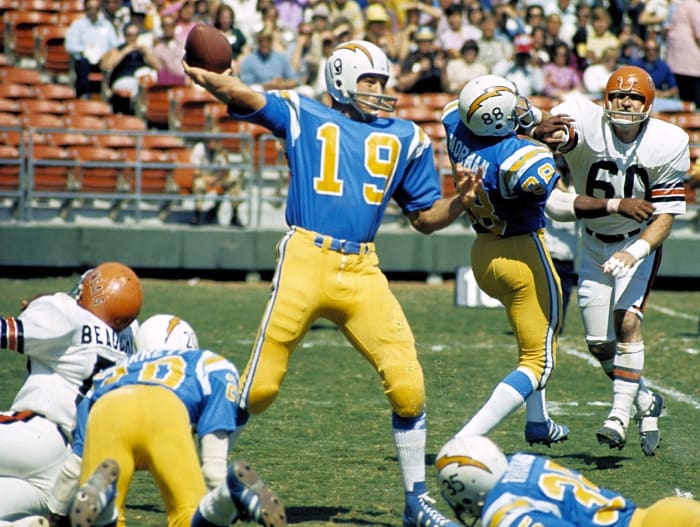
Opposing Namath during part of the Colts' Super Bowl III loss, Unitas beat his 1969 opponent to California upon being traded to the Chargers in a low-level deal. Committing to a hasty rebuild in 1972, GM Joe Thomas benched Unitas and traded him before knowing the team would have Bert Jones draft access (it took the Oilers taking D-lineman John Matuszak for the Colts to nab Jones at No. 2). Unitas, however, was well past his prime by 1973. The Chargers benched the legendary passer four games into his age-40 season, making a rare Hall of Famer-to-Hall of Famer transfer by giving Fouts -- a rookie third-round pick -- an early opportunity.
Ken Stabler (Oakland Raiders): Daryle Lamonica
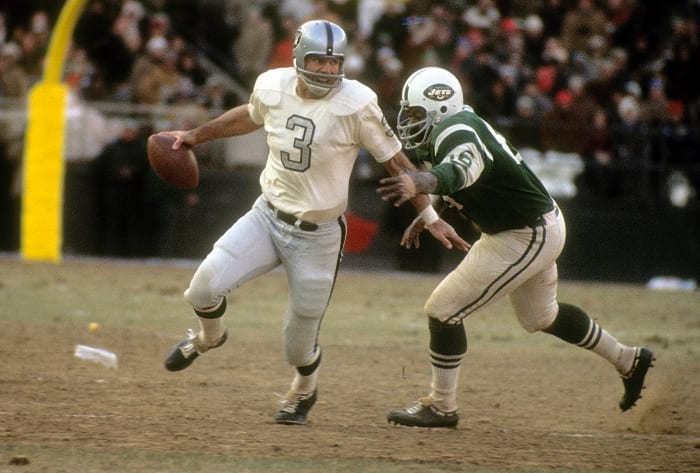
In a strategy that would have been unfeasible today, the Raiders kept Stabler on the bench for five seasons. They drafted the future Bay Area icon in the 1968 second round, but Lamonica -- a 1967 trade pickup who made a level jump in Oakland -- remained the team's starter even after Stabler had provided a spark in the 1972 divisional playoff (better known for the Immaculate Reception). John Madden kept a frustrated Stabler as the backup to open 1973 as well, as Lamonica had made a fourth Pro Bowl as a Raider in 1972. The two-time AFL MVP, who led Oakland to Super Bowl II and was 6-for-6 in playoff berths as a starter, was finally benched three games into the '73 slate.
Johnny Unitas (San Diego Chargers): John Hadl
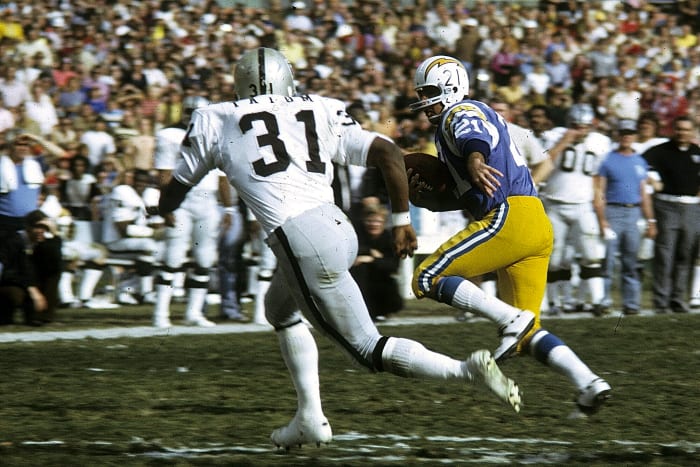
Sid Gillman's primary triggerman, Hadl quarterbacked the Chargers during much of their AFL days. With Gillman the Oilers GM by 1973, the Bolts made a shortsighted decision to acquire Unitas in a low-level trade. This preceded a Hadl trade to the Rams, one that brought back young defensive end talent Coy Bacon. Hadl started 122 Chargers games, helping the team to three AFL championship games (being Tobin Rote's backup in San Diego's 1963 title season). Lance Alworth's QB made four All-AFL teams and was a Pro Bowler at 32 in 1972. Still, the Chargers moved on for a shopworn Unitas. The Rams traded Hadl (to the Packers) -- in a 1974 heist -- after a Pro Bowl '73.
Roger Staubach (Dallas Cowboys): Craig Morton

Staubach's climb had Tom Landry navigating player frustration. Cowboys cogs urged the iconic head coach to pick a quarterback, as he had been alternating starts between Staubach and Morton. This reached the craziest place during a Bears game that featured a play-by-play rotation between the QBs. A 1965 first-round pick, Morton had waited behind Don Meredith for four seasons, receiving his chance in 1969. He had held off Staubach, after the latter's arrival following his years-long naval commitment, and led the Cowboys to a Super Bowl V loss. Landry picked Staubach in 1971, and the Cowboys rolled to a Super Bowl VI rout. The Cowboys traded Morton to the Giants at the 1974 deadline.
Terry Bradshaw ( Pittsburgh Steelers): Dick Shiner
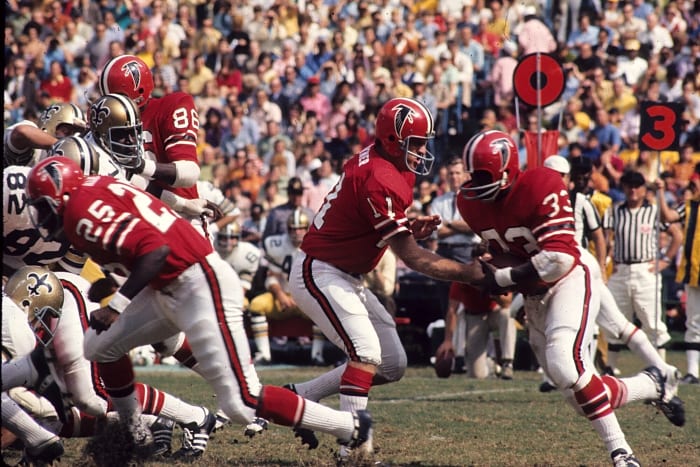
A presumably more sophisticated society accepted a "Dick Shiner" operating as a starting quarterback, and his most extended run came in Pittsburgh. The Steelers acquired Shiner from the Browns in 1968 and traded him (to the Giants) not long after drafting Bradshaw No. 1 in 1970. Shiner started 20 games with Pittsburgh, and a rebuilding team went 3-16-1 in those late-1960s tilts. Chuck Noll inherited Shiner in his first season running the show, and the Steelers used him as both a starter and backup in a 1-13 season that landed them Bradshaw. Franco Harris RB sidekick Frenchy Fuqua was part of the package the Giants sent the Steelers for Shiner.
Bob Griese (Miami Dolphins): Dick Wood
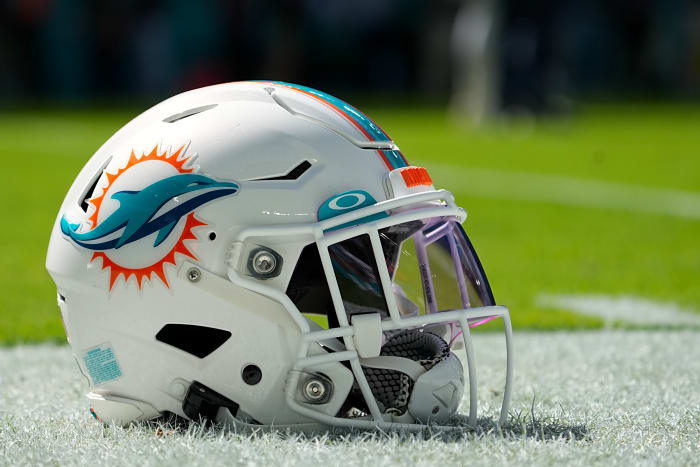
The 1966 Dolphins employed a head coach and quarterback named George Wilson. By the end of Miami's inaugural season, the expansion team was using Wood as its starter. Originally a 12th-round Colts pick in 1959, Wood did not play a down in Baltimore but resurfaced with relocated ex-Colts HC Weeb Ewbank. The Jets used Wood as their starter in every game from 1963-64, but upon acquiring Joe Namath, they traded him to the Raiders. Oakland lost Wood to Miami in the 1966 expansion draft. Wood completed a ghastly 36.1% of his passes in '66, his final season, and the team's 3-11 record helped secure Griese draft access.
Joe Namath (New York Jets): Mike Taliaferro
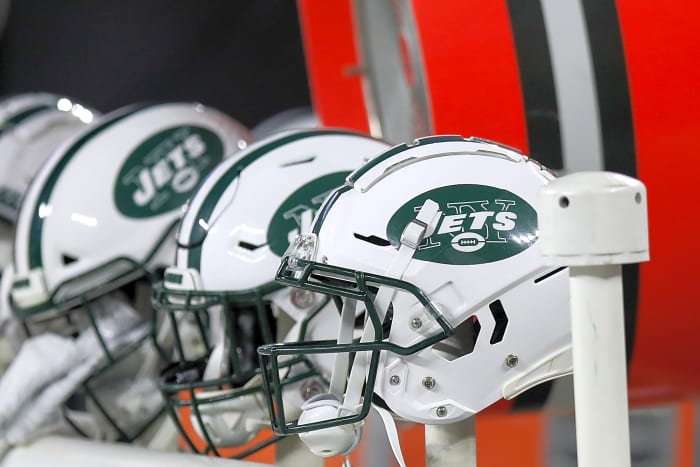
With Wood traded to the Raiders in 1965, the Jets still constructed a short bridge to Namath. This brought one of the more unusual ascents by a Hall of Fame QB. Ewbank inserted Namath into the lineup but benched him for performance reasons. Taliaferro, a 28th-round Jets pick in 1963, started the '65 opener -- despite Namath's No. 2 overall draft arrival -- before being benched one game in. Ewbank then pulled Namath after three starts, giving Taliaferro three more. After being demoted for good, Taliaferro stayed as Namath's backup for two more seasons before a trade (for veteran QB Babe Parilli) to the Patriots. Taliaferro earned Pro Bowl acclaim as Boston's 1969 starter.
Sonny Jurgensen (Washington): Norm Snead
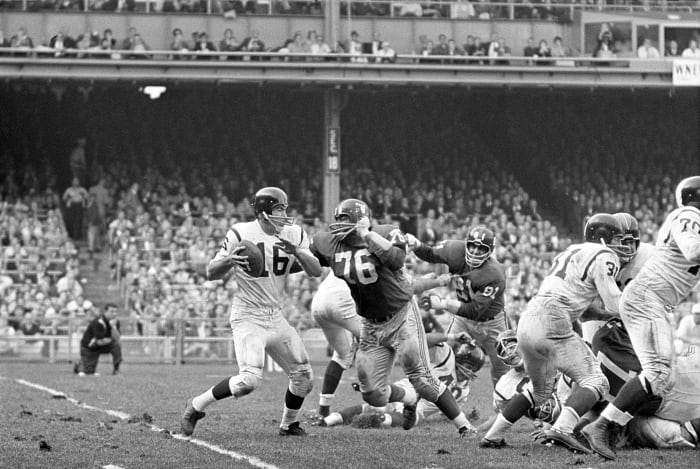
Fifty-one years before the Eagles and Rams exchanged starting QBs (Nick Foles, Sam Bradford), Philadelphia had done so involving a future Hall of Famer. The team traded Jurgensen after three starter years, acquiring Snead -- a former No. 2 overall Washington draftee who had made back-to-back Pro Bowls entering 1964 -- in the high-profile swap. The April Fool's Day trade irked Jurgensen, who threw five TD passes in a 385-yard showing to push Washington past Philly in his first meeting with his former team. Snead started every Washington game from 1961-63 and was in place during lean Eagles years until 1970. He was later traded three more times before retiring in 1977.
Len Dawson (Dallas Texans): Cotton Davidson
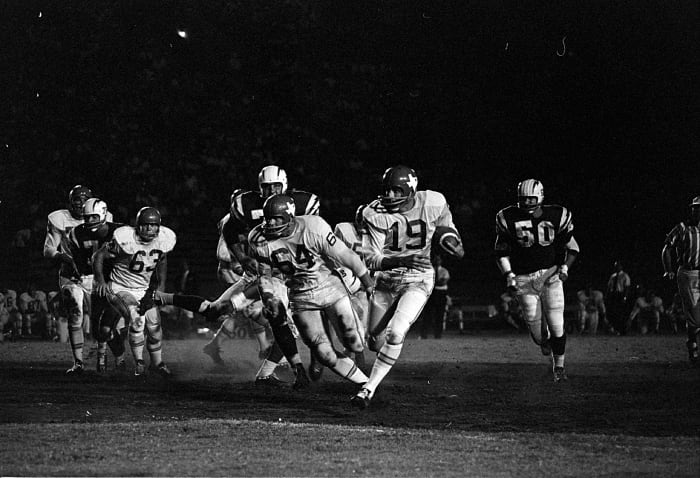
It took Dawson -- a former Browns and Steelers backup -- until his sixth season to earn a starting chance. It came at Davidson's expense. The Texans, who morphed into the Chiefs in 1963, had used Davidson as their starter since the AFL's 1960 debut. Dallas had pulled Davidson off the Baylor sideline, where he was an assistant, after the ex-Colt's brief CFL stint. One game into the 1962 season, the Texans traded Davidson to the Raiders for a first-round pick. The then-lowly team bottomed out, making the pick No. 1 overall (and Hall of Fame D-tackle Buck Buchanan). Davidson was a one-year Raiders starter but stayed as a backup for six more.
Fran Tarkenton (Minnesota Vikings): George Shaw

The Steve DeBerg of his day, Shaw served as a stopgap for multiple Hall of Famers. The second such instance came for the expansion Vikings in 1961. Shaw's arrival in Minnesota was quite expensive, as the Vikings traded a 1962 first-round pick for him in January 1961. Predating the Russell Wilson-Matt Flynn situation by 61 years, Shaw arrived after not being a regular starter since Johnny Unitas' Baltimore ascent. The ex-Colt-turned-Giant backup (to Charlie Conerly) had become unhappy. While Shaw was the first starting QB in Vikings history, Tarkenton -- a 1961 third-round pick -- usurped him five games into the season and stuck around for 18 years.
Y.A. Tittle (New York Giants): Charlie Conerly
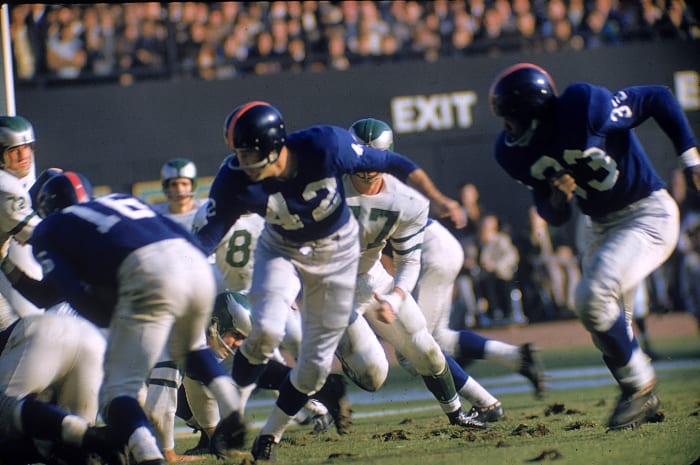
Although Phil Simms' Giants tenure eclipses Conerly's in length, it took until Eli Manning to find a starter run that lasted this long with the franchise. The Giants traded for Conerly, previously a Sammy Baugh backup in Washington, in 1948. The low-cost move provided tremendous value; Conerly's franchise TD pass record stood until Simms' 13th season (1991). The Giants used Conerly as their primary starter from 1948-60; the team ventured to three NFL championship games -- as an unrivaled coordinator combo of Vince Lombardi and Tom Landry was in place -- and won it all in 1956. The Tittle trade with the 49ers did not come until Conerly's final season (at 40).
Sonny Jurgensen (Philadelphia Eagles): Norm Van Brocklin
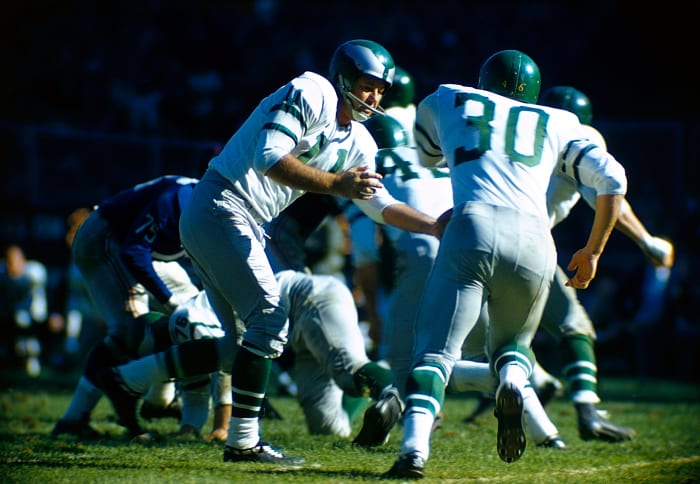
Jurgensen twice saw his Eagles path change. After four rookie-year starts in 1957, the future Philly trade chip observed the organization acquire Van Brocklin in a deal with the Rams. At odds with then-Rams coach Sid Gillman, Van Brocklin received a fresh start -- one that demoted Jurgensen to a three-year backup. Van Brocklin went 3-for-3 in Pro Bowls during his Eagles run and wrapped his career with one of the NFL's signature final seasons. The prickly passer/future HC won MVP honors and led the Eagles to the NFL title, being the only team to beat Lombardi's Packers in the playoffs during the legendary coach's tenure.
George Blanda ( Chicago Bears) Bob Williams
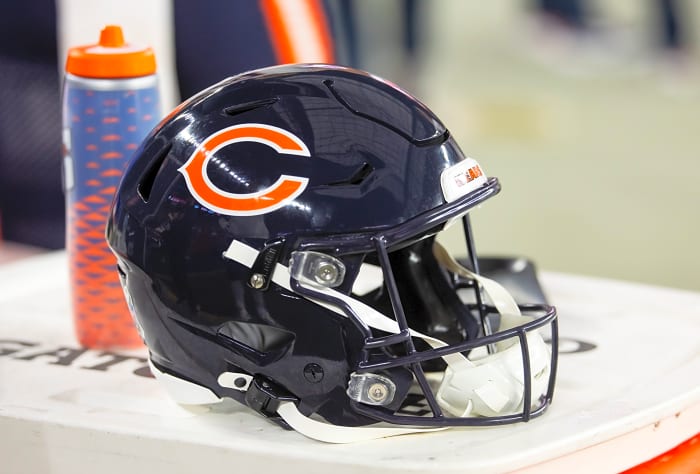
Better known for his time with the Oilers and as a Raiders kicker, Blanda briefly ascended to the Bears' QB1 post in the mid-1950s. Blanda made 21 starts for the Bears from 1952-54, helping Harlon Hill to rookie-year dominance. Williams entered the NFL with greater fanfare, being the No. 2 overall pick (out of Notre Dame) in 1951. The former Fighting Irish star started seven games (to Blanda's two) in 1952. He then served in the Korean War for two years, returning for a cameo in 1955. Williams retired soon after. Blanda, whose career lasted through the 1975 season, fell out of favor with George Halas and spent 1959 out of football after backing up Ed Brown for four seasons.
Bobby Layne (Pittsburgh Steelers): Earl Morrall

Almost the Kevin Bacon of QBs, Morrall played for six teams over a 21-year career. He was traded four times, finishing his career alongside Hall of Famers Johnny Unitas and Bob Griese. The second of the Morrall trades involved Layne, whom the Lions shocked with a September 1958 trade. Morrall, the No. 2 overall pick in 1956, went from Pittsburgh to Detroit in the deal. The then-Y.A. Tittle-led 49ers had traded Morrall to the Steelers in 1957, and he earned a Pro Bowl nod during a lone full season as Pittsburgh's starter. Morrall started two games for the Steelers in 1958; he was primarily a fill-in during his five-plus seasons in Detroit.
Norm Van Brocklin (Philadelphia Eagles): Bobby Thomason
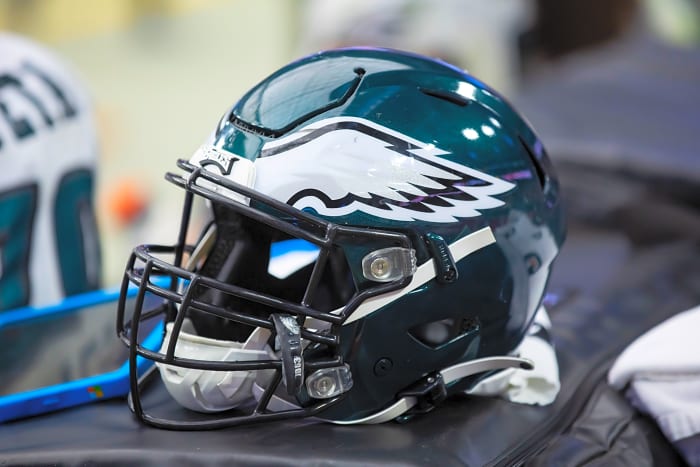
Although Jurgensen made four starts as an Eagles rookie in 1957, Thomason was Philadelphia's primary signal-caller in the years before Van Brocklin's 1958 arrival. A former Rams top-10 pick during Van Brocklin's time in L.A., Thomason had no real path to playing time while Van Brocklin and fellow Hall of Famer Bob Waterfield were there. By 1952, Thomason was in Philly via trade. He started 44 games as an Eagle from 1952-57, splitting time with Adrian Burk and earning three Pro Bowl accolades. Thomason posted a 400-yard game, while Burk's seven TD passes in a 1954 contest still hold a share of the NFL record. Burk was gone by 1957.
Bart Starr (Green Bay Packers): Tobin Rote
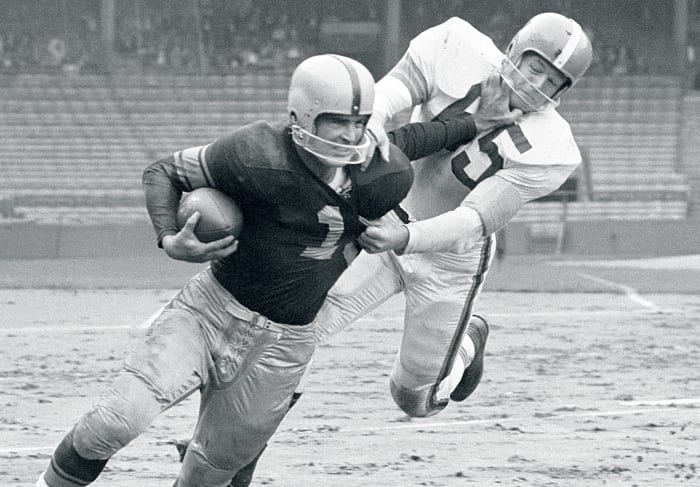
The 1950s did not go especially well for the Packers, but Rote certainly carried considerable talent. Starr's predecessor led the NFL in passing TDs twice and set a QB rushing record (523 yards in 1951) that stood 20 years. Rote started every game for the Pack as a 1950 rookie and finished his Wisconsin stay with 73 starts. After a 1956 Pro Bowl season, Rote expressed shock when told during training camp the team traded him to the Lions. Rote became valuable to Detroit soon, as Bobby Layne's broken leg thrust his backup into action. Rote piloted the Lions to their third title that year, later winning an AFL crown as a Charger.
Johnny Unitas (Baltimore Colts): George Shaw
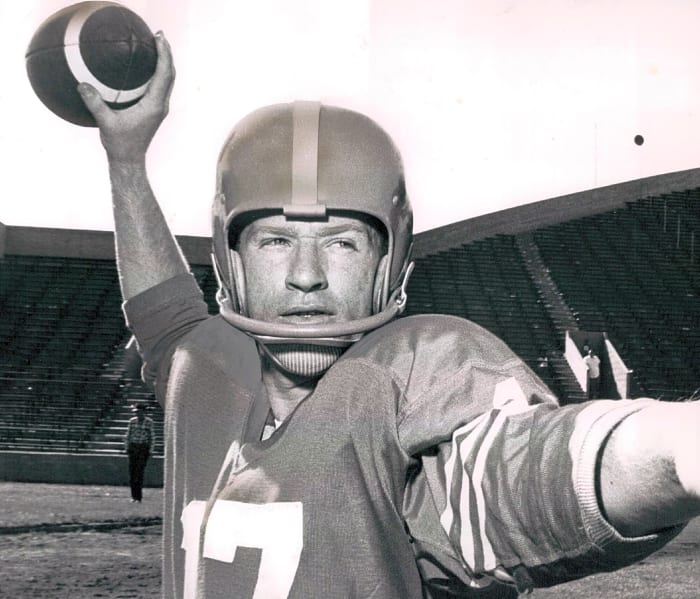
Years before Tarkenton quickly usurped Shaw in Minnesota, he was in place as the Colts' starter. Baltimore led off the 1955 draft by taking the Oregon star, immediately plugging him into the starting lineup. Shaw made it through 17 starts as a Colt before a seminal injury intervened. A broken kneecap sidelined Shaw five games into the 1956 season, ushering in Unitas -- a scrap-heap QB who had been at the semipro level not long before. Shaw did not reacquire the job, eventually becoming known as a backup to the likes of Unitas, Charlie Conerly and Tarkenton. Shaw finished his career with an AFL stop (in Denver) in 1962.
Y.A. Tittle (San Francisco 49ers): Frankie Albert
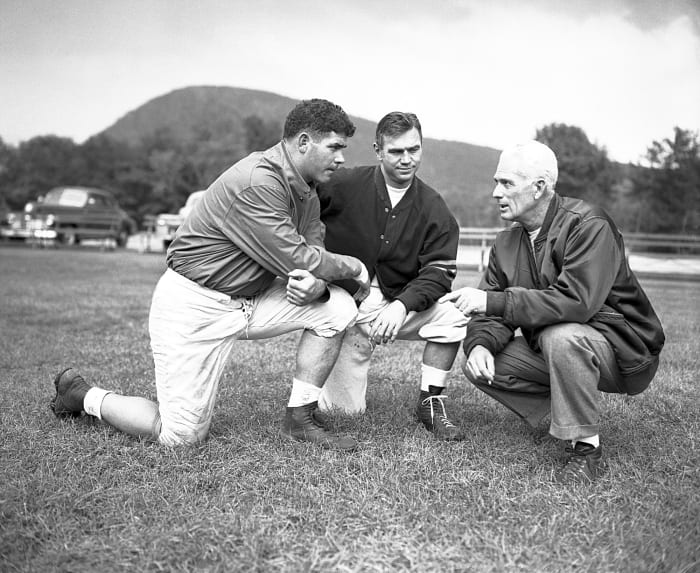
Albert both preceded Tittle as San Francisco's starter and later coached him. Years prior to moving into the head coaching role with the 49ers, Albert was the team's quarterback from its All-American Football Conference inception in 1946. A first-round Bears pick in 1942, Albert remained the 49ers' starter after their transition into the NFL ranks in 1950. Thrice a second-team All-AAFC player (as Otto Graham gobbled up the first-team honors), the left-hander earned Pro Bowl acclaim in his NFL debut. Tittle stepped in during the 1952 season, Albert's last, and the latter returned as 49ers HC in 1956.
Norm Van Brocklin (Los Angeles Rams): Bob Waterfield
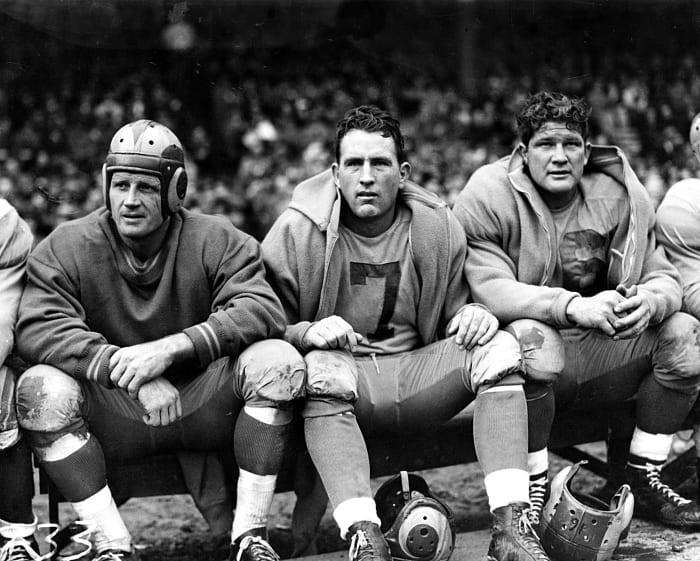
Before Joe Montana and Steve Young, the Rams boasted the NFL's top QB room. Two Hall of Fame-bound passers in their primes resided in L.A. by the early 1950s, and the Rams became one of the rare teams to use a two-quarterback system effectively. Waterfield, who beat Van Brocklin to the NFL by four years, quarterbacked the Cleveland Rams to the 1945 NFL title and was a three-time first-team All-Pro. He and Van Brocklin, however, shared duties from 1950-51 -- a period that produced astonishing offensive success. The '50 Rams' 38.8 points per game remain the NFL record, while a near-even passing split produced an NFL title a year later. Waterfield retired after the 1952 season.
Bobby Layne (Detroit Lions): Frank Tripucka
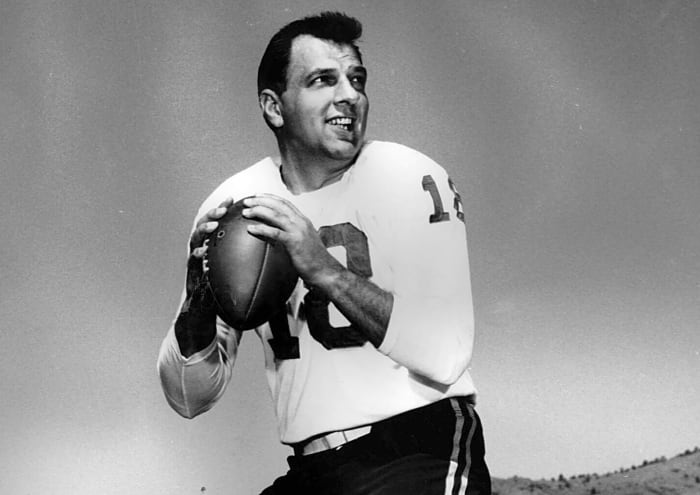
When Peyton Manning signed with the Broncos, he asked Tripucka for permission to wear his retired number 18. More than 10 years before the Denver franchise's inception, Tripucka was at the controls in Detroit. Tripucka, Fred Enke and Clyde LeForce all made starts for the 1949 Lions; Tripucka -- a first-round rookie -- closed the season as the team's primary passer. Tripucka threw nine TD passes as a rookie during a 4-8 Lions season. The Lions then changed their fortunes by trading two first-round picks to the New York Bulldogs for Layne, who led a loaded Detroit roster to titles in 1952 and '53. Tripucka was out of Detroit by 1950 and in the then-better-paying CFL by '53.
Bob Waterfield (Cleveland Rams): Albie Reisz
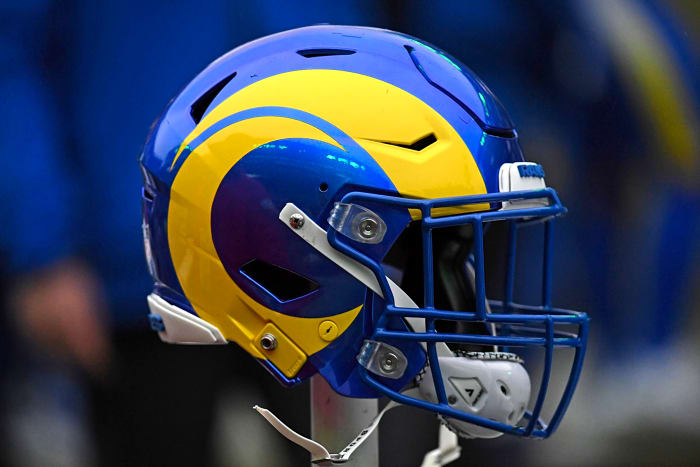
The Rams played in Cleveland from 1937-45, leaving for L.A. soon after winning their first championship. Waterfield joined the Browns as a fifth-round pick in 1945. However, the UCLA alum took over as the team's quarterback early. A few arms thew passes for the Rams in their final pre-Waterfield season; Reisz's 113 attempts led the way. Born in nearby Lorain, Ohio, Reisz joined the Rams as an undrafted free agent in 1944. Reisz still made an impact with Waterfield around, intercepting two passes as a safety during the Rams' '45 championship season. He added an INT in Cleveland's 15-14 win over Washington for the title.
Sid Luckman (Chicago Bears): Bernie Masterson
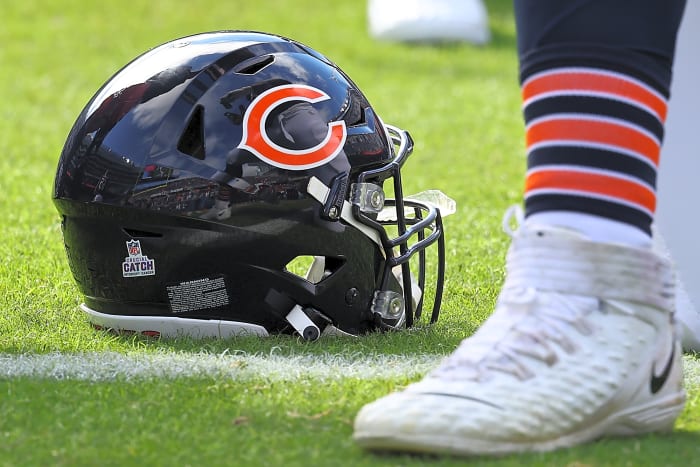
Remaining the best QB in Bears history, Luckman entered the NFL in 1939 as the No. 2 overall pick. The franchise savior came to a Bears team coming off a 6-5 season. Masterson served as the primary passer for George Halas' team in 1938. Even as the passing game was in its infancy in the NFL, Masterson still played a big role during Luckman's rookie year. He topped his 1938 pass total (112) by one, while Luckman threw just 51. By Luckman's second year, however, the Bears stampeded to the most dominant championship win in NFL history -- a 73-0 win over Washington. That was Masterson's final NFL game; he moved into coaching immediately.
Sammy Baugh (Washington): Boston fields committee
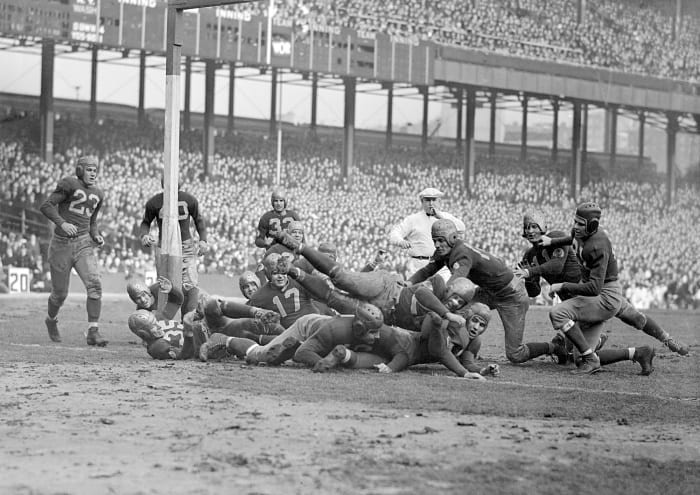
As the franchise relocated from Boston to Washington in Baugh's first year, it also began to move the game forward. Baugh became a T-formation gunslinger whose career held up well enough to land on the NFL's 100th Anniversary team. Prior to Baugh's 1937 first-round arrival, Boston had five players throw between 33 and 52 passes. This formula produced five TD passes and 23 INTs, but with the forward pass still wildly inconsistent in this era, Boston still motored to the NFL title game -- before losing to the Packers (and league-leading passer Arnie Herber). Hall of Famer Cliff Battles led Boston with 52 passes in 1936.
Sam Robinson is a sportswriter from Kansas City, Missouri. He primarily covers the NFL for Yardbarker. Moving from wildly injury-prone sprinter in the aughts to reporter in the 2010s, Sam set up camp in three time zones covering everything from high school water polo to Division II national championship games
More must-reads:
- Buccaneers 'definitely' made John Harbaugh move before Todd Bowles decision
- Nick Sirianni 'identity' comments spell trouble for the Eagles' playoff chances
- The '2025 leading receiver by team' quiz
Breaking News
Trending News
Customize Your Newsletter
 +
+
Get the latest news and rumors, customized to your favorite sports and teams. Emailed daily. Always free!
PRIVACY POLICY EDITORIAL POLICY CONTACT US
ABOUT YARDBARKER TERMS OF SERVICE
Use of this website (including any and all parts and
components) constitutes your acceptance of these
Terms of Service and Privacy Policy.
This site is for entertainment purposes only.
There is no gambling offered on this site.
Gambling Problem? Call 1-800-Gambler.








